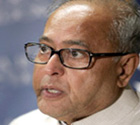
Following NSG’s “clean and unconditional” waiver to India that lifted 34-year-old nuclear isolation, questions as also backed by Left and oppositions still raise apprehension: Does the Indo-US nuclear deal undermines India's right of conducting nuclear tests in future? And if, circumstances force India to go for nuclear bomb explosion, what complications it would have to face then?
India repeatedly has been saying that it retains the sovereign right to conduct nuclear tests in future. Former president and nuclear scientist APJ Abdul Kalam has also said the Indo-US nuclear deal and the Nuclear Suppliers Group (NSG) exemption is in the interest of India and New Delhi may snap its “voluntary moratorium” on nuclear test in future in “supreme national interest.”
Clarifying the supreme national interest, Mr. Kalam said if in future India had to go for conducting nuclear test it would mean some kind of external circumstances had forced India to do atomic test. In such circumstances, the exemption may come to a halt or they may terminate the agreement. But, the national interest is supreme, he added.
Similar kind of statement said by External Affairs Minister Pranab Mukherjee after NSG approved for exemption to India on Saturday. He said future testing could invite international sanctions again as had done earlier in 1974 and 1998.
In the light of this statement, it spills water on the apprehension that deal undermines India's right to atomic test. But it also justifies a part of US “secret letter” that says US may scrap the deal if India go for atomic test.
Similarly, the cartel of NSG countries—some of whom as said approved waiver under US pressure—might stop dealing in nuclear commerce and technology with India as in accordance with the apprehensions expressed by Pranab Mukherjee–international sanctions.
Moreover, NSG exemption mean India is no longer isolated in nuclear trade and commerce but India would have to wait to deal in civil nuclear commerce with the rest of the world till India-US nuclear deal is not passed by the US Congress. And as US is already racing against time owing to presidential elections this year, India might have to wait for new Congress and new Administration. Furthermore, there is no guarantee that the new Congress would accept the 123-agreement in the same way as it is today.
The 123 agreement after exposing the US State Department's 'secret letter' has also come under scrutiny. Indian officials have expressed doubt that it will be risky for the country to buy nuclear weapons from America until this issue is sorted out.
Moreover, anti-deal lobby in the US Congress wants to attach riders to the 123 agreement. Under such circumstances India needs to secure its interests and should not go ahead blindly on the deal in the name of political victory for the Congress. Nuclear energy is the need of the hour to meet the country's growing energy requirements, but on the deal India needs to move cautiously keeping country's national interest first.
|
|
Read More: Delhi


Comments: